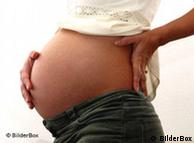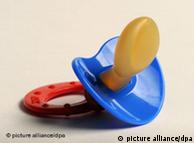After the relative calm of pregnancy, giving birth is a
physically and emotionally draining experience. But the changes don't
stop there. A woman's estrogen levels drop significantly, and she now
has to care for a crying baby 24 hours a day. Given these circumstances
it's no wonder that up to 75 percent of new mothers around the world
feel down for a few days after giving birth.
But new research has found there's an additional neurological cause to the baby blues as well.
Feelings of impotence
Anne-Christin B., who prefered not to use her last name due to the
stigma of postpartum depression, is a 33-year-old mother from Berlin.
For the first day or two after her daughter was born four months ago,
she felt happy, but that quickly changed.
"Then came the feeling that I couldn't do things. I was afraid. I
couldn't do things for the child - for whatever reason," she remembered.
"And then I started to withdraw, I couldn't go out or talk with friends
on the telephone and this increased very quickly to the point where I
couldn't be by myself anymore."
Anne-Christin isn't the only one. Millions of German women also
experience the baby blues. In her case, she was one of 15 percent of
women who develop postpartum depression. She went to her local doctor,
but he didn't take her seriously, so she sought professional psychiatric
help.
The source of the problem
 Bildunterschrift: Großansicht des Bildes mit der Bildunterschrift: Decreased serotonin levels are believed to be a culprit of postpartum depression
Bildunterschrift: Großansicht des Bildes mit der Bildunterschrift: Decreased serotonin levels are believed to be a culprit of postpartum depression
Dr. Julia Sacher, from the Max Planck Institute for Human Cognitive
and Brain Sciences in Leipzig, said it's well-documented that a sharp
drop in estrogen levels and a big change in environment contribute to
the baby blues. That's why research in this area is incredibly
important.
"What we do know is that those women who have severe symptoms of
postpartum blues have a higher risk of experiencing a full-blown episode
later on," Sacher said.
Sacher and her colleagues published the results of their study in the
peer-reviewed journal, Archives of General Psychiatry, earlier this
summer. They found that there is a neurological cause for the baby
blues.
"We see an increase in monoamine oxidase A and this can lead to a
loss of serotonin, and a loss of serotonin has been associated with low
mood," Sacher explained.
Feeling sad after childbirth is socially unacceptable
Other medical professionals, like Dr. Stephanie Krueger, said that
this new study may prompt obstetricians to keep an eye on a mother's
moods both before and after childbirth.
Krueger is a professor of psychiatry at the Charite in Berlin, one of
the largest university hospitals in Europe. She treated Anne-Christin
for post-partum depression. Krueger - who wasn't part of the study -
said most women who feel depressed after their child is born don't seek
necessary help, because it's not socially acceptable to feel sad at this
time.
"In our culture, women who have just given birth are supposed to be
happy, and if they are not, then there's something wrong with them and
they are actually treated as some kind of an outlaw," Krueger said,
adding, "in many cases they are being told: why aren't you happy?"
Krueger believes there needs to be more education and support for new mothers.
"Families and GPs [general practitioner] should not take these things
lightly and not say, 'Well yeah I understand you've just given birth -
everything will be fine'," Krueger said.
"Physicians and families should take any symptoms of depression
seriously and go to someone who knows what they are doing, meaning a
psychiatrist, for example."
Berlin mother Anne-Christin B. said she wished her doctors and other
medical professionals had talked to her about the baby blues during the
pregnancy.
"It would have been better if, even in a midwifery course, there was
perhaps 30 minutes or an hour discussion in preparation for pregnancy,
where it was explained, where you explain the symptoms and also tell
people where they can call for help," Anne-Christin said.
 Bildunterschrift: Großansicht des Bildes mit der Bildunterschrift: Experts say the dramatic life changes brought by babies contribute to depression
Bildunterschrift: Großansicht des Bildes mit der Bildunterschrift: Experts say the dramatic life changes brought by babies contribute to depression
Dietary supplements could help
While the baby blues usually goes away by itself after a couple of
days, Dr. Sacher from the Max Planck Institute said treating this
temporary condition could be an important step in preventing postpartum
depression. She thinks the baby blues could be treated with medication
or dietary supplements, which could counter the increase in the enzyme
monoamine oxidase A.
But not everyone agrees the baby blues can be prevented so easily.
Lisa Fehrenbach has been a midwife for 35 years. She said feeling a bit
down after childbirth is a natural thing because childbirth is a
physically and emotionally life-changing experience. Many women go from
working full-time to being at home with a crying baby - often by
themselves.
"You had a completely independent life and you organized everything
and you had everything under control and suddenly there's a little
baby," said Fehrenbach, "It clings to your body 24 hours and you have to
care for it 24 hours and you cannot do what you want, but you have to
do what the baby wants."
Fehrenbach said even if women took dietary supplements to counter the
enzyme increase, they still have to adjust to this new baby in their
lives.
Beyond making pregnant women aware of the physiological and
psychological changes in their bodies, both Sacher and Krueger agree
this problem needs to be discussed openly in order to fight the stigma
of postpartum blues and depression.
"Postpartum disorders are nothing the woman is responsible for. They
can't help it," Krueger said. "It has biological reasons for the most
part and it can be treated effectively and it should be treated
effectively."
Sacher's next step will be to test for the elevated enzyme in postpartum depression.
Author: Cinnamon Nippard
Editor: Stuart Tiffen
http://www.dw-world.de/dw/article/0,,5940759,00.htm









